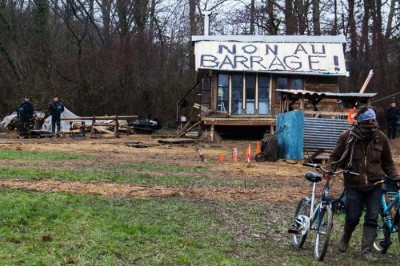In solidarity to the heroic struggle of ZADists in Nantes and Testet to defend land and its sustainable use against the imperialistic capital and its puppet state of France, and to prevent further social and environmental disaster to spread, we selected this article as a sample of reporting from self-organized counterinformation in English. We wish we could follow the events but our availability of French speakers and translators is very limited.Rémi lives among all of us who will continue to struggle neglecting all the violence, terrorism, and ruthlessness that state repressive mechanisms utilize to break up any form of social resistance develops against their destructive plans.
France: October 27th, 2014
Background info on the struggle against the dam in Testet: 1, 2
According to a statement from squatters in the ZAD of Notre-Dame-des-Landes,
during the night between Saturday and Sunday the 26th of October 2014 a
protester named Remi was killed in clashes that broke out after a rally
against the construction of a dam along the Sivens forest in the
wetland of Testet in the Tarn department (southern France).France: October 27th, 2014
Background info on the struggle against the dam in Testet: 1, 2
 Around 7000 people gathered in the ZAD (zone to be defended) of
Testet, after months of police attacks and destruction of the wetland
and habitations of those who defend the area. In the late evening and
overnight, dozens of people attacked the forces of order that were
protecting the dam construction site. Activists expressed their anger
trying to delay the resumption of works, originally scheduled for Monday
the 27th of October.
Around 7000 people gathered in the ZAD (zone to be defended) of
Testet, after months of police attacks and destruction of the wetland
and habitations of those who defend the area. In the late evening and
overnight, dozens of people attacked the forces of order that were
protecting the dam construction site. Activists expressed their anger
trying to delay the resumption of works, originally scheduled for Monday
the 27th of October.

.png)